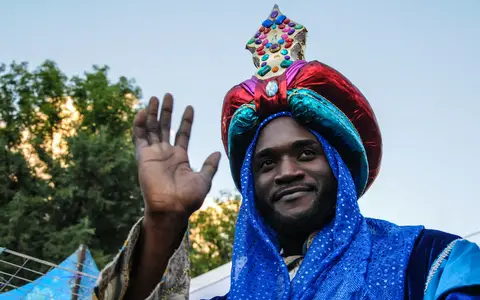Haitian migrants work in the traditional scenarios to take the souvenir photo with the Wise Men. They represent King Baltasar in the Alameda Sur, in the Coyoacán mayor’s office
“My name is Jon Chadafan Edson, I am a Haitian, it is not something so easy but I feel very lucky to be here on the stage as one of the Wise Men”, he said.
Edson has been living with his wife and two children in the Iztapalapa mayor’s office for two months. He currently works in a fiberglass workshop where they made the pieces of the scenography for this season.
“I have been in this job for a month, it is not easy to find work, sometimes they ask you for INE or a letter to work and looking I found the workshop and there they offered me to be one of the Wise Men. There was where we made the pieces like Mario Bross and the Princess”, he told El Sol de México.
The owners of various photographic stands gave the opportunity to Haitian migrants to work and represent Baltasar. Zuri Zadai Domínguez, owner of one of the scenographies, highlighted that the first day they began to install the stand, several Haitians who take refuge in the mayor’s offices of Tláhuac and Iztapalapa came to apply for work.
“The first day we arrived here there were several Haitians asking for work in each of the scenographies, but in most of the stands they already have their trusted Wise Men.
The Wise Men charge between 250 and 300 pesos a day plus tips and food during the season from December 24 to January 6. The last day of work they share the tip, which can range from six to seven thousand pesos each.
“Many people have taken it very well because they say that these Wise Men look authentic and original, but other people discriminate them a little, they do not let them touch them, help them get on the stand or things like that, but they are very few”, she stressed.
One of Edson’s advantages is that he speaks Spanish, which has helped him communicate better with Mexicans. He said his favorite food is cochinita pibil.
“I had the dream of being in Mexico, I feel very lucky, I will not stay here for long, my boss treats me well, his wife treats me well, they are humble and kind people, that’s how they are in Mexico”, Edson said while greeting the children.
In another of the scenarios, Mario Alberto Uribe Ramírez employed three Haitian migrants, two men and a woman, to whom he gave asylum in his house in the Iztapalapa mayor’s office.
“I met them because I am a teacher in a school and they went to look for Spanish classes, but they cannot be enrolled because they do not have documents and from there, I gave them asylum in my house”, he explained.
“Unfortunately, Mexicans do not want to work and although I only needed one to exemplify King Baltasar, we did not want to separate them and we had to employ the three brothers”, he added.
In this stand one of the Haitians takes the souvenir photo and another represents Baltasar, while the young woman offers photographs to the people. They pay them 250 pesos a day plus their tips and lodging.
“It is an exchange and benefit for everyone, although they do not speak Spanish we explain what the work consists of, they already know what has to be done and here we understand each other by signs, already at night when we are at home they write to me with the translator, they tell me that they feel very grateful”, explained the owner of the business.
Mr. Mario spent Christmas and New Year with his family and the three migrant brothers, where they shared the Mexican traditions with the Haitians.
They defeat The Blackface
The director of the Civil Association Racismo MX, José Héctor Aguilar Contreras, said that this job for Haitian migrants is a positive advance.
The activist explained that blackface is an English expression that means black face, which seeks to interpret and ridicule black people, however, he recalled that in Mexico there is a high prevalence of people who come from Africa who have been erased and whitened in the history of the country.
“In our country we have this idea that we are mestizos, which is the mixture of an indigenous person with a Spanish person, but we have historically erased black people, who were always the second most important population of our country,” he said.
Aguilar Contreras considered that for this type of informal jobs, the rights of migrant people should be reviewed so that they are not violated, since being people who do not have official papers, they are in a state of vulnerability or could be victims of labor abuse.
Source: El Sol de Mexico







